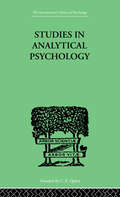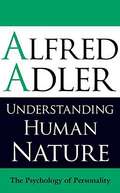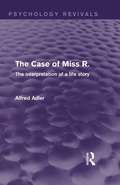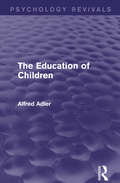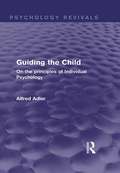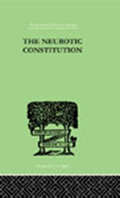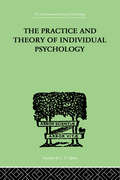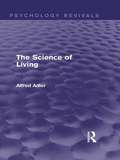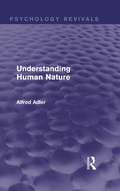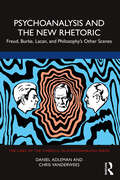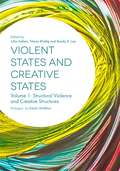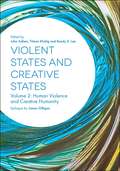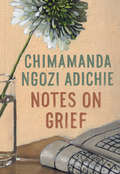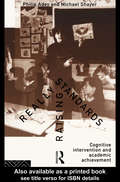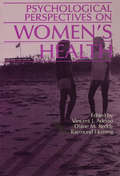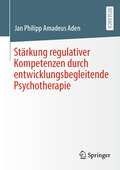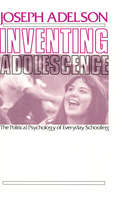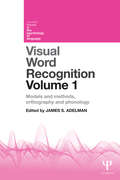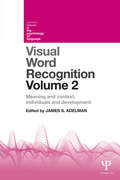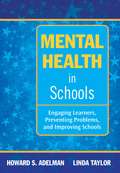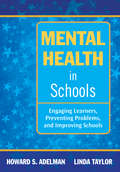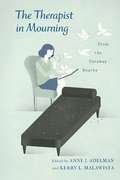- Table View
- List View
Studies in Analytical Psychology (International Library Of Psychology)
by Gerhard AdlerFirst published in 1999. Routledge is an imprint of Taylor & Francis, an informa company.
Understanding Human Nature: The Psychology of Personality (Psychology Revivals Ser.)
by Alfred Adler Colin BrettLong-regarded as the handbook of Individual Psychology, Understanding Human Nature provides an engaging introduction to Adler's key concepts including: inferiority and superiority complexes; life style; memories and dreams; love, marriage and children; and sexuality and sexual problems. Adler's holistic approach to the study of personality saw him challenge the dominance of Freud's thinking (his friend and colleague) and develop a truly innovative, and still highly relevant, method of psychoanalysis. A straightforward, clearly-written book, it shows the seminal thinking of a great mind and provides a basis to understand both Adler's unique theories and the development of twentieth-century psychology, in which his work has played such an important part.
The Case of Miss R.: The Interpretation of a Life Story (Psychology Revivals)
by Alfred AdlerOriginally published in 1929 the individual psychological interpretation of this autobiography was first presented by Alfred Adler to a group of psychiatrists and pedagogues in Vienna. The story of the development of a neurosis is told in this book. A young girl relates the fascinating story of her unhappy life, the psychologist comments on her remarks and leads the reader to an understanding of the blunders and mistakes which have made her life so full of suffering. Publication of this book in its day was intended to bring the growing interest in Adler’s Individual Psychology to a wider audience. Today it can be read and enjoyed in its historical context.
The Education of Children: Individual Psychology In The Schools And The Education Of Children: Education For Prevention (Psychology Revivals)
by Alfred AdlerOriginally published in 1930, this title looks at the education of children. Adler believes the problems from a psychological point of view are the same as for adults, that of self-knowledge and rational self-direction. However, the difference being that due to the ‘immaturity of children, the question of guidance – never wholly absent in the case of adults – takes on supreme importance.’ The title starts by presenting the Individual Psychology viewpoint as a whole, with the later chapters undertaking to tackle in more depth the various interrelated problems of children’s education.
Guiding the Child: On the principles of Individual Psychology (Psychology Revivals)
by Alfred AdlerFirst published in 1930 this book was written under the leadership and inspiration of Alfred Adler. He and a group of physicians and educators organized 28 child guidance clinics in Vienna, Berlin and Munich in the years prior to publication. Conducted according to the tenets of Individual Psychology, these clinics revealed many new and stimulating problems that they felt were as applicable to conditions in America and England at the time as in the experimental countries. The book was designed as an organized and connected account of the problems, accomplishments and failures encountered in the daily work, reported from actual experience by the experts in charge. Adler edited the volume and assigned each subject to the specialist in that field. The result was designed to be of value to the welfare worker, the physician, and the forward-looking parent of the time. Today it can be read and enjoyed in its historical context.
The Neurotic Constitution: OUTLINES OF A COMPARATIVE INDIVIDUALISTIC PSYCHOLOGY and (Select Bibliographies Reprint Ser.)
by Adler, AlfredFirst Published in 1999. Routledge is an imprint of Taylor & Francis, an informa company.
The Practice And Theory Of Individual Psychology
by Adler, AlfredFirst Published in 1999. Routledge is an imprint of Taylor & Francis, an informa company.
The Science of Living (Psychology Revivals)
by Alfred AdlerOriginally published in 1930 The Science of Living looks at Individual Psychology as a science. Adler discusses the various elements of Individual Psychology and its application to everyday life: including the inferiority complex, the superiority complex and other social aspects, such as, love and marriage, sex and sexuality, children and their education. This is an important book in the history of psychoanalysis and Adlerian therapy.
Understanding Human Nature: The Psychology Of Personality (Psychology Revivals)
by Alfred AdlerOriginally published in 1928 this book was an attempt to acquaint the general public with the fundamentals of Individual Psychology. At the same time it is a demonstration of the practical application of these principles to the conduct of everyday relationships, and the organization of our personal life. Based upon a years’ lectures to audiences at the People’s Institute in Vienna, the purpose of the book was to point out how the mistaken behaviour of the individual affects harmony of our social and communal life; to teach the individual to recognize their own mistakes; and finally, to show them how they may effect a harmonious adjustment to the communal life. Adler felt that mistakes in business or in science were costly and deplorable, but mistakes in the conduct of life are usually dangerous to life itself. This book is dedicated by the author in his preface ‘to the task of illuminating man’s progress toward a better understanding of human nature.’
Psychoanalysis and the New Rhetoric: Freud, Burke, Lacan, and Philosophy's Other Scenes (The\lines Of The Symbolic In Psychoanalysis Ser.)
by Daniel Adleman Chris VanderweesPsychoanalysis and the New Rhetoric: Freud, Burke, Lacan, and Philosophy's Other Scenes is an innovative work that places the fields of psychoanalysis and rhetoric in dynamic resonance with one another. The book operates according to a compelling interdisciplinary conceit: Adleman provocatively explores the psychoanalytic aspects of rhetoric and Vanderwees probes the rhetorical dimensions of psychoanalytic practice. This thoroughly researched text takes a closer look at the "missed encounter" between rhetoric and psychoanalysis. The first section of the book explores the massive, but underappreciated, influence of Freudian psychoanalysis on Kenneth Burke’s "new rhetoric." The book’s second section undertakes sustained investigations into the rhetorical dimensions of psychoanalytic concepts such as transference, free association, and listening. Psychoanalysis and the New Rhetoric then culminates in a more comprehensive discussion of Lacanian psychoanalysis in the context of Kenneth Burke’s new rhetoric. The book therefore serves as an invaluable aperture to the fields of psychoanalysis and rhetoric, including their much overlooked disciplinary entanglement. Psychoanalysis and the New Rhetoric will be of great interest to scholars of psychoanalytic studies, rhetoric, language studies, semiotics, media studies, and communication studies.
Violent States and Creative States: Structural Violence and Creative Structures (Volume #1)
by John Adlam Tilman Kluttig Bandy LeeThis is a provocative collection exploring the different types of violence and how they relate to one another, examined through the integration of several disciplines, including forensic psychotherapy, psychiatry, sociology, psychosocial studies and political science. By examining the 'violent states' of mind behind specific forms of violence and the social and societal contexts in which an individual act of human violence takes place, the contributors reveal the dynamic forces and reasoning behind specific forms of violence including structural violence, and conceptualise the societal structures themselves as 'violent states'. Other research often stops short at examining the causes and risk factors for violence, without considering the opposite states that may not only mitigate, but allow for a different unfolding of individual and societal evolution. As a potential antidote to violence, the authors prescribe an understanding of these 'creative states' with their psychological origins, and their importance in human behaviour and meaning-seeking. Making a call to move beyond merely mitigating violence to the opposite direction of fostering creative potential, this book is foundational in its capacity to cultivate social consciousness and effect positive change in areas of governance, policy-making, and collective responsibility. Volume 1: Structural Violence and Creative Structures covers structural and symbolic violence, with violent states and State violence, and with creative responses and creative states at the local and global levels.
Violent States and Creative States: Human Violence and Creative Humanity (Volume #2)
by John Adlam Tilman Kluttig Bandy LeeThis is a provocative collection exploring the different types of violence and how they relate to one another, examined through the integration of several disciplines, including forensic psychotherapy, psychiatry, sociology, psychosocial studies and political science. By examining the 'violent states' of mind behind specific forms of violence and the social and societal contexts in which an individual act of human violence takes place, the contributors reveal the dynamic forces and reasoning behind specific forms of violence including structural violence, and conceptualise the societal structures themselves as 'violent states'. Other research often stops short at examining the causes and risk factors for violence, without considering the opposite states that may not only mitigate, but allow for a different unfolding of individual and societal evolution. As a potential antidote to violence, the authors prescribe an understanding of these 'creative states' with their psychological origins, and their importance in human behaviour and meaning-seeking. Making a call to move beyond merely mitigating violence to the opposite direction of fostering creative potential, this book is foundational in its capacity to cultivate social consciousness and effect positive change in areas of governance, policy-making, and collective responsibility. Volume 2: Human Violence and Creative Humanity explores violent states of mind, behavioural or subjective, interpersonal violence (including self-injury) and the fine distinctions between violent and creative states of mind.
Notes on Grief
by Chimamanda Ngozi AdichieFrom the globally acclaimed, best-selling novelist and author of We Should All Be Feminists, a timely and deeply personal account of the loss of her father. Notes on Grief is an exquisite work of meditation, remembrance, and hope, written in the wake of Chimamanda Ngozi Adichie's beloved father’s death in the summer of 2020. As the COVID-19 pandemic raged around the world, and kept Adichie and her family members separated from one another, her father succumbed unexpectedly to complications of kidney failure. In this extended essay, which originated in a New Yorker piece, Adichie shares how this loss shook her to her core. She writes about being one of the millions of people grieving this year; about the familial and cultural dimensions of grief and also about the loneliness and anger that are unavoidable in it. With signature precision of language, and glittering, devastating detail on the page--and never without touches of rich, honest humor--Adichie weaves together her own experience of her father’s death with threads of his life story, from his remarkable survival during the Biafran war, through a long career as a statistics professor, into the days of the pandemic in which he’d stay connected with his children and grandchildren over video chat from the family home in Abba, Nigeria. In the compact format of We Should All Be Feminists and Dear Ijeawele, Adichie delivers a gem of a book--a book that fundamentally connects us to one another as it probes one of the most universal human experiences. Notes on Grief is a book for this moment—a work readers will treasure and share now more than ever--and yet will prove durable and timeless, an indispensable addition to Adichie's canon.
Notes on Grief
by Chimamanda Ngozi AdichieNotes on Grief is an exquisite work of meditation, remembrance, and hope, written in the wake of Chimamanda Ngozi Adichie's beloved father’s death in the summer of 2020. <P><P>As the COVID-19 pandemic raged around the world, and kept Adichie and her family members separated from one another, her father succumbed unexpectedly to complications of kidney failure. Expanding on her original New Yorker piece, Adichie shares how this loss shook her to her core. She writes about being one of the millions of people grieving this year; about the familial and cultural dimensions of grief and also about the loneliness and anger that are unavoidable in it. <P><P>With signature precision of language, and glittering, devastating detail on the page--and never without touches of rich, honest humor--Adichie weaves together her own experience of her father’s death with threads of his life story, from his remarkable survival during the Biafran war, through a long career as a statistics professor, into the days of the pandemic in which he’d stay connected with his children and grandchildren over video chat from the family home in Abba, Nigeria. <P><P>In the compact format of We Should All Be Feminists and Dear Ijeawele, Adichie delivers a gem of a book--a book that fundamentally connects us to one another as it probes one of the most universal human experiences. Notes on Grief is a book for this moment—a work readers will treasure and share now more than ever--and yet will prove durable and timeless, an indispensable addition to Adichie's canon.
Really Raising Standards: Cognitive intervention and academic achievement
by Philip Adey Dr Michael Shayer MICHAEL ShayerWritten by experienced teachers and educational researchers Phillip Adey and Michael Shayer, Really Raising Standards analyses attempts to teach children to think more effectively and efficiently. Their practical advice on how to improve children's performance by the application of the findings of the CASE research project will radically alter the approach of many professional teachers and student teachers as to the education of children in schools. An important contribution to the application of psychological theory in education.
Psychological Perspectives On Women's Health
by Vincent J. AdessoSignificant scientific advances have been made in understanding psychological aspects of women's health, and knowledge gained will be of relevance not only to women's health but to the promotion of health and illness prevention and treatment for all individuals. The current cutting-edge research detailed in this volume is intended to stimulate new thinking and research in women's health from biopsychosocial perspectives. Drawing on research from internationally respected experts, topics covered include ageing, stress, heart disease, cancer, drugs, weight regulation and body image, pain, menstruation, sexuality and infertility, and AIDS.
Stärkung regulativer Kompetenzen durch entwicklungsbegleitende Psychotherapie
by Jan Philipp AdenDie Adaptation an die Bedingungen der Lebensphase des Alters verlangt von älteren Menschen hohe selbstregulatorische Leistungen. Die Selbstregulation nimmt daher eine Schlüsselposition für die Umsetzung erfolgreicher Alternsprozesse ein. Im Rahmen von zwei empirischen Teilstudien werden die Beziehungen unterschiedlicher selbst- und entwicklungsregulatorischer Faktoren mit Indikatoren erfolgreichen Alterns untersucht. Die Ergebnisse zeigen, dass selbstregulatorische Kompetenzen einen Beitrag zu erhöhtem Wohlbefinden im Alter leisten. Psychotherapie kann als entwicklungsbegleitende, kompensatorische Ressource fungieren, um die selbstregulatorischen Kompetenzen älterer Menschen zu stärken.
Inventing Adolescence: The Political Psychology of Everyday Schooling
by Joseph AdelsonThere is a widespread and deep awareness that all is not well with American public education nor with the students, educators, and administrators who are charged with making citizens literate. Joseph Adelson's work has gained considerable prominence in this ongoing reevaluation. Writing with force, verve, and the tools of advanced study, Adelson's book provides what might be the most comprehensive look at American education since the work of Diane Ravitch. The materials include revised and updated versions of essays that caused a real stir when they first appeared in the pages of Commentary, Daedalus, The American Scholar, and The Public Interest, among other places.The work goes against the grain of rhetoric but quite with the grain of the best in social science: That the erosion of trust in the American young has been far less severe than in the American old, that the degree of pathology, alienation, and rebelliousness in the American adolescent population is far from alarming. On the whole, each and every serious research study shows the vast majority of teenagers to be competent, purposeful, at ease with themselves, and closely bonded to their families and their values. This is, however, no pollyannish version of American education, but a tough-minded critique of educators and administrators who prefer ideological generalities to empirical truths, and whose vested interests are not in the requirements of learning, but ultimately in its subversion. The invention of adolescence was a search for a problem child more nearly detected in problematic adults.
Idleness, Contemplation and the Aesthetic, 1750–1830
by Richard AdelmanReconstructing the literary and philosophical reaction to Adam Smith's dictum that man is a labouring animal above and before all else, this study explores the many ways in which Romantic writers presented idle contemplation as the central activity in human life. By contrasting the British response to Smith's political economy with that of contemporary German Idealists, Richard Adelman also uses this consideration of the importance of idleness to Romantic aesthetics to chart the development of a distinctly British idealism in the last decades of the eighteenth century. Exploring the work of Adam Smith, Jeremy Bentham, Friedrich Schiller, William Cowper, Samuel Taylor Coleridge, Mary Wollstonecraft and many of their contemporaries, this study pinpoints a debate over human activity and capability taking place between 1750 and 1830, and considers its social and political consequences for the cultural theory of the early nineteenth century.
Visual Word Recognition Volume 1: Models and Methods, Orthography and Phonology (Current Issues in the Psychology of Language)
by James S. AdelmanWord recognition is the component of reading which involves the identification of individual words. Together the two volumes of Visual Word Recognition offer a state-of-the-art overview of contemporary research from leading figures in the field. This first volume outlines established theory, new models and key experimental evidence used to investigate visual word recognition: lexical decision and word naming. It also considers methodological concerns: new developments in large databases, and how these have been applied to theoretical questions; and control considerations when dealing with words as stimuli. Finally, the book considers the visual-orthographic input to the word recognition system: from the left and right-hand sides of vision, through the processing of letters and their proximity, to the similarity and confusability of words, and the contribution of the spoken-phonological form of the word. The two volumes serve as a state-of-the-art, comprehensive overview of the field. They are essential reading for researchers of visual word recognition, as well as undergraduate and postgraduate students of cognition and cognitive psychology, specifically the psychology of language and reading. They will also be of use to those working in education and speech-language therapy.
Visual Word Recognition Volume 2: Meaning and Context, Individuals and Development (Current Issues in the Psychology of Language)
by James S. AdelmanWord recognition is the component of reading which involves the identification of individual words. Together the two volumes of Visual Word Recognition offer a state-of-the-art overview of contemporary research from leading figures in the field. This second volume examines how research on word recognition has been linked to the study of concepts and meaning, such as how morphemes affect word recognition, how the meaning of words affects their processing and the effect of priming on the processing of words. The book also discusses eye-movement research, the reading of whole sentences and passages, how bilinguals recognize words in different languages, individual differences in visual word recognition, and the development of visual word recognition difficulties in developmental dyslexia. The two volumes serve as a state-of-the-art, comprehensive overview of the field. They are essential reading for researchers of visual word recognition, and students on undergraduate and postgraduate courses in cognition and cognitive psychology, specifically the psychology of language and reading. They will also be of use to those working in education and speech-language therapy.
Mental Health in Schools: Engaging Learners, Preventing Problems, and Improving Schools
by Howard S. Adelman Linda TaylorFor many children, schools are the main or only providers of mental health services. In this visionary and comprehensive book, two nationally known experts describe a new approach to school-based mental health—one that better serves students, maximizes resources, and promotes academic performance. The authors describe how educators can effectively coordinate internal and external resources to support a healthy school environment and help at-risk students overcome barriers to learning. School leaders, psychologists, counselors, and policy makers will find essential guidance, including: • An overview of the history and current state of school mental health programs, discussing major issues confronting the field • Strategies for effective school-based initiatives, including addressing behavior issues, introducing classroom-based activities, and coordinating with community resources • A call to action for higher-quality mental health programming across public schools—including how collaboration, research, and advocacy can make a difference Gain the knowledge you need to develop or improve your school's mental health program to better serve both the academic and mental health needs of your students!
Mental Health in Schools: Engaging Learners, Preventing Problems, and Improving Schools
by Howard S. Adelman Dr Linda TaylorThis visionary and comprehensive book presents a new approach to school-based mental health, including how to better serve students and maximize resources through coordinated programs.
The Therapist in Mourning: From the Faraway Nearby
by Anne J. Adelman Kerry L. MalawistaThe unexpected loss of a client can be a lonely and isolating experience for therapists. While family and friends can ritually mourn the deceased, the nature of the therapeutic relationship prohibits therapists from engaging in such activities. Practitioners can only share memories of a client in circumscribed ways, while respecting the patient's confidentiality. Therefore, they may find it difficult to discuss the things that made the therapeutic relationship meaningful. Similarly, when a therapist loses someone in their private lives, they are expected to isolate themselves from grief, since allowing one's personal life to enter the working relationship can interfere with a client's self-discovery and healing. For therapists caught between their grief and the empathy they provide for their clients, this collection explores the complexity of bereavement within the practice setting. It also examines the professional and personal ramifications of death and loss for the practicing clinician. Featuring original essays from longstanding practitioners, the collection demonstrates the universal experience of bereavement while outlining a theoretical framework for the position of the bereft therapist. Essays cover the unexpected death of clients and patient suicide, personal loss in a therapist's life, the grief of clients who lose a therapist, disastrous loss within a community, and the grief resulting from professional losses and disruptions. The first of its kind, this volume gives voice to long-suppressed thoughts and emotions, enabling psychologists, psychiatrists, counselors, and other mental health specialists to achieve the connection and healing they bring to their own work.
The Therapist In Mourning
by Anne J. Adelman Kerry L. MalawistaThe unexpected loss of a client can be a lonely and isolating experience for therapists. While family and friends can ritually mourn the deceased, the nature of the therapeutic relationship prohibits therapists from engaging in such activities. Practitioners can only share memories of a client in circumscribed ways, while respecting the patient's confidentiality. Therefore, they may find it difficult to discuss the things that made the therapeutic relationship meaningful. Similarly, when a therapist loses someone in their private lives, they are expected to isolate themselves from grief, since allowing one's personal life to enter the working relationship can interfere with a client's self-discovery and healing. For therapists caught between their grief and the empathy they provide for their clients, this collection explores the complexity of bereavement within the practice setting. It also examines the professional and personal ramifications of death and loss for the practicing clinician. Featuring original essays from longstanding practitioners, the collection demonstrates the universal experience of bereavement while outlining a theoretical framework for the position of the bereft therapist. Essays cover the unexpected death of clients and patient suicide, personal loss in a therapist's life, the grief of clients who lose a therapist, disastrous loss within a community, and the grief resulting from professional losses and disruptions. The first of its kind, this volume gives voice to long-suppressed thoughts and emotions, enabling psychologists, psychiatrists, counselors, and other mental health specialists to achieve the connection and healing they bring to their own work.
